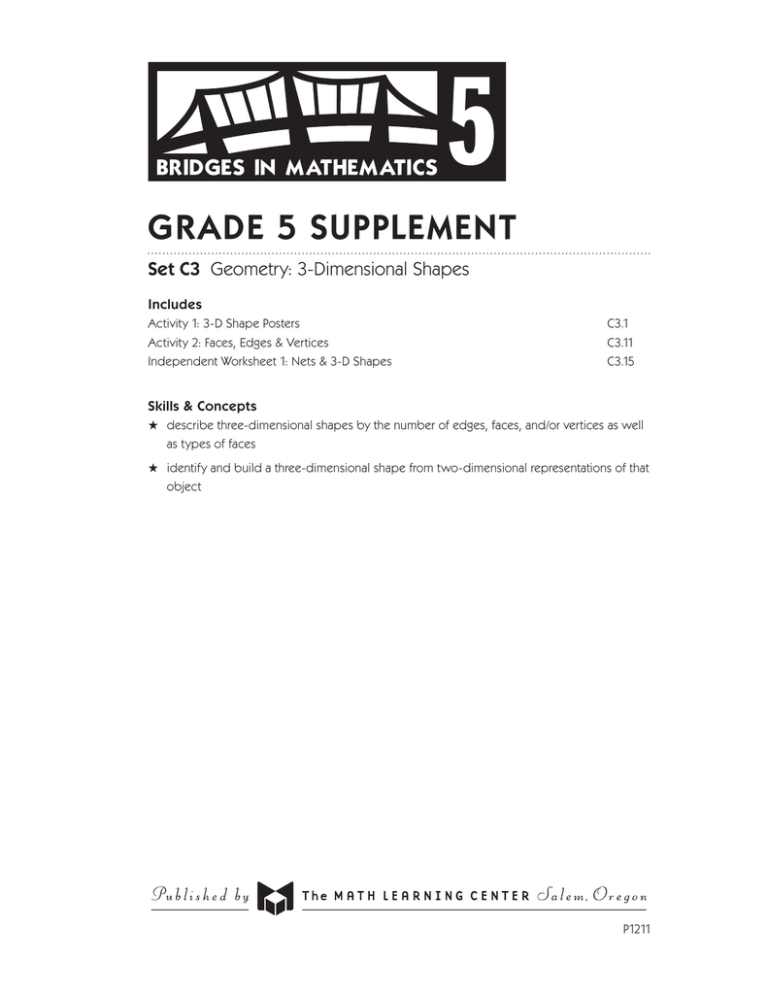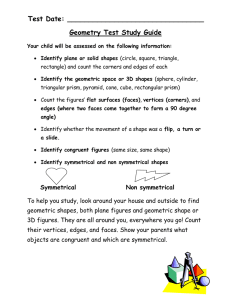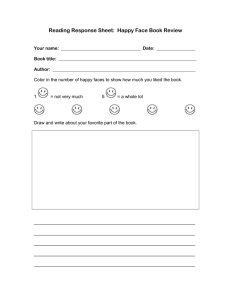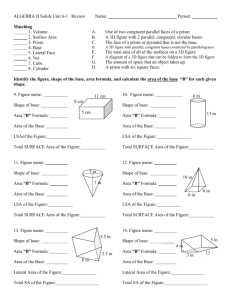
GRADE 5 SUPPLEMENT
Set C3 Geometry: 3-Dimensional Shapes
Includes
Activity 1: 3-D Shape Posters Activity 2: Faces, Edges & Vertices Independent Worksheet 1: Nets & 3-D Shapes
C3.1
C3.11
C3.15
Skills & Concepts
H describe three-dimensional shapes by the number of edges, faces, and/or vertices as well
as types of faces
H identify and build a three-dimensional shape from two-dimensional representations of that
object
P1211
Bridges in Mathematics Grade 5 Supplement
Set C3 Geometry: 3-Dimensional Shapes
The Math Learning Center, PO Box 12929, Salem, Oregon 97309. Tel. 1 800 575–8130.
© 2008 by The Math Learning Center
All rights reserved.
Prepared for publication on Macintosh Desktop Publishing system.
Printed in the United States of America.
P1211
The Math Learning Center grants permission to classroom teachers to reproduce blackline
masters in appropriate quantities for their classroom use.
Bridges in Mathematics is a standards-based K–5 curriculum that provides a unique blend
of concept development and skills practice in the context of problem solving. It incorporates the Number Corner, a collection of daily skill-building activities for students.
The Math Learning Center is a nonprofit organization serving the education community.
Our mission is to inspire and enable individuals to discover and develop their mathematical
confidence and ability. We offer innovative and standards-based professional development,
curriculum, materials, and resources to support learning and teaching. To find out more,
visit us at www.mathlearningcenter.org.
Set C3 Geometry: 3-Dimensional Shapes
Set C3 H Activity 1
ACTIVITY
3-D Shape Posters
Overview
You’ll need
After discussing some of the attributes of a prism, students work in groups of 4 to construct 3-dimensional
figures and create posters about them.
H Nets A–F (pages C3.4–C3.9, see Advance Preparation)
Skills & Concepts
H cereal box or something similar
H describe three-dimensional shapes by the number of
edges, faces, and/or vertices as well as types of faces
H blank transparencies
H overhead pens
H 18" × 24" chart paper, 1 piece for every 4 students
H 21/2" × 51/2" pieces of copy paper, 2–3 per student
plus extra
H poster supplies (scissors, tape, glue sticks, felt markers)
H Student Math Journals
H Word Resource Cards (congruent, edge, face, parallel
lines, perpendicular lines, vertex)
H math dictionaries or access to the Internet (optional)
Advance Preparation Run one copy of each Net blackline on heavy paper or cardstock. If you have more than
24 students, run an extra copy of one of the sheets for every 4 additional students. Place the Word Resource Cards
on display before the activity.
Instructions for 3-D Shape Posters
1. Tell the class that you’re going to do some work with 3-dimensional figures, or solids today. Then hold
up the cereal box and ask students to pair-share mathematical observations about it.
2. Make a rough sketch of the box on a transparency at the overhead. Work with student input to label
the parts of the figure, and take the opportunity to review the meanings of the words face, edge, and vertex. Introduce the term base as well (a base is a “special face”, often thought of as the top or the bottom of
a 3-dimensional figure).
3. Ask volunteers to come to the front of the room and identify parallel, perpendicular, and congruent
edges and faces on the box itself. Though many students may be familiar with parallel and perpendicular lines, the idea that edges and faces can be parallel may be new to some. As they find these parts, explain that the box is called a rectangular prism because it has 2 congruent rectangular bases and 4 faces
that are quadrilaterals. Prisms always have 2 bases, while some other 3-dimensional figures have only 1
© The Math Learning Center
Bridges in Mathematics Grade 5 Supplement • C3.1
Set C3 Geometry: 3-Dimensional Shapes
Activity 1 3-D Shape Posters (cont.)
(a pyramid) or even none (a sphere). Here is an example of how your overhead might look after labeling
the sketch and recording some of the observations shared by the class.
Base (a special face:
the top and bottom)
Edge: where
2 faces meet
Face: flat surface
Base
Vertex: corner point
Rectangular Prism
• 6 faces all rectangular (2 are bases)
• 12 edges
• 8 vertices
• 2 congruent parallel rectangular bases
• 2 pairs of congruent parallel faces
• every pair of faces that meets is perpendicular
• lots of parallel and perpendicular edges
4. Ask students to form groups of 4 or assign groups. Show them the Nets A–F sheets, along with a piece
of chart paper. Explain that a net is a 2-dimensional shape that can be cut and folded to form a 3-dimensional shape. In a minute, each group will get a net to cut, fold, and tape. When they’re finished, they’ll
cut and tape their figure and then create a poster about it, recording as many observations as they can,
much as you’ve just done at the overhead.
5. Hold up a few of the copy paper strips. Explain that each student in the group will be responsible for
writing at least 3 observations, each one on a separate strip, to glue onto the poster. They’ll need to work
together to make sure that their observations are true and different from all the others written by the
group. Their poster needs to include the name of the figure as well as their observation strips. Their observations need to address all the terms on the Word Resource Cards you’ve posted, including parallel,
perpendicular, and congruent edges and faces. Ask students not to attach the figures to the posters because
you’ll need them for another activity.
6. Review the poster requirements with the class by jotting them on the overhead. You may want to add
others, such as using complete sentences; making their work neat, organized, and attractive; labeling
the poster with their names; and so on.
C3.2 • Bridges in Mathematics Grade 5 Supplement
© The Math Learning Center
Set C3 Geometry: 3-Dimensional Shapes
Activity 1 3-D Shape Posters (cont.)
Net Posters
• Cut, fold, and tape your shape.
• Each write at least 3 different observations,
1 per paper strip.
• Observations need to include comments about parallel,
perpendicular, and congruent edges and faces.
• Glue strips to poster.
• Label poster with the name of your shape.
• Do not attach shape to the poster.
7. When students understand what to do, give each group a Net sheet, a piece of chart paper, and a handful of paper strips, and let them go to work. If they don’t know the name of the shape they’ve made, have
them look it up at the back of their math journal. You might also encourage them to use any math dictionaries you have on hand or go online to find shape names and also more information to add to their
posters. Students might also be interested in listing some of the places their shape could be found in the
environment and adding some drawings or even photos of real-life examples.
8. When students are finished, display the posters along with the shapes. Pin the shapes on or near their
posters in such a way that you can take them down when you do Activity 10, and then put them back up.
Note Here is a list of the 3-dimensional shapes formed by the Net blacklines:
Net A—Cube
Net B—Rectangular Prism
Net C—Hexagonal Prism
Net D—Triangular Pyramid
Net E—Square Pyramid
Net F—Triangular Prism
© The Math Learning Center
Bridges in Mathematics Grade 5 Supplement • C3.3
Set C3 Geometry: 3-Dimensional Shapes Blackline Run 1 copy on heavy paper or cardstock.
Net A
A
C3.4 • Bridges in Mathematics Grade 5 Supplement
© The Math Learning Center
Set C3 Geometry: 3-Dimensional Shapes Blackline Run 1 copy on heavy paper or cardstock.
Net B
B
© The Math Learning Center
Bridges in Mathematics Grade 5 Supplement • C3.5
Set C3 Geometry: 3-Dimensional Shapes Blackline Run 1 copy on heavy paper or cardstock.
Net C
C
C3.6 • Bridges in Mathematics Grade 5 Supplement
© The Math Learning Center
Set C3 Geometry: 3-Dimensional Shapes Blackline Run 1 copy on heavy paper or cardstock.
D
Net D
© The Math Learning Center
Bridges in Mathematics Grade 5 Supplement • C3.7
Set C3 Geometry: 3-Dimensional Shapes Blackline Run 1 copy on heavy paper or cardstock.
Net E
E
C3.8 • Bridges in Mathematics Grade 5 Supplement
© The Math Learning Center
Set C3 Geometry: 3-Dimensional Shapes Blackline Run 1 copy on heavy paper or cardstock.
Net F
F
© The Math Learning Center
Bridges in Mathematics Grade 5 Supplement • C3.9
C3.10 • Bridges in Mathematics Grade 5 Supplement
© The Math Learning Center
Set C3 Geometry: 3-Dimensional Shapes
Set C3 H Activity 2
ACTIVITY
Faces, Edges & Vertices
Overview
You’ll need
This activity features a whole-group game in which students identify various attributes of 6 different geometric
shapes.
H Faces, Edges & Vertices Game Board (page C3.14, run 1
copy on a transparency)
Skills & Concepts
H overhead pens
H describe three-dimensional shapes by the number of
edges, faces, and/or vertices as well as types of faces
H double overhead spinner overlay
H paper shapes from Set C3 Activity 1
H geoblocks (optional, see note)
Recommended Timing
Anytime after Set C3 Activity 1
Note It would be ideal if each group of 4 students could
have a set of 3-dimensional shapes to examine as you’re
playing this game with the class. If your entire school is
using Bridges, you may want to borrow sets of wooden
3-D shapes called geoblocks from a third or fourth grade
teacher for this purpose. If you’re able to borrow some
sets, pull the 6 matching shapes from each set and put
the rest of the blocks away for now.
Instructions for Faces, Edges & Vertices
1. Divide the class into 2 teams and explain that they’re going to play a game with the 3-D shapes they made
during Geometry—3-D Shapes Activity 1. Set the 6 shapes with their letters facing outward on
the whiteboard ledge or a small table near the overhead and review the name of each shape with the class.
Cube
Rectangular
Prism
Hexagonal
Prism
Regular Triangular
Pyramid
Square
Pyramid
Triangular
Prism
~
=
congruent
© The Math Learning Center
=
2. Place the gameboard on display at the overhead and set the double spinner overlay on top of the spinners. Explain that the letters on the first spinner correspond to the letters on the 6 shapes. Review the
terms on the second spinner and introduce the symbols for congruent, parallel, and perpendicular:
parallel
perpendicular
Bridges in Mathematics Grade 5 Supplement • C3.11
Set C3 Geometry: 3-Dimensional Shapes
Activity 2 Faces, Edges & Vertices (cont.)
Set C3 Geometry: 3-Dimensional Shapes Blackline Run 1 copy on a transparency.
Faces, Edges, and Vertices Gameboard
D
B
Pairs of
Edges
C
Pairs of
Faces
Team 1
Figure Name
~
=
Edges
=
E
~
=
Faces
=
F
A
Pairs of
Edges
Pairs of
Faces
Team 2
Points
Figure Name
Points
3. Ask a volunteer from the first team to spin both spinners and record the name of the shape spun.
Then invite a volunteer from the second team to come up. Have both students examine the shape very
carefully to count the number of congruent faces or edges or determine how many pairs of parallel or
perpendicular faces or edges there are. (What they count depends on the spin.) If there is disagreement,
invite a second pair of students to examine the shape until both teams agree.
Note If a shape has a set of 2 or 3 congruent faces or edges, each face or edge in the set counts. For instance,
the triangular prism below has 2 congruent triangular faces and 3 congruent rectangular faces. That’s 5 in all.
It has 3 congruent edges on each base and 3 congruent edges in between the bases. That’s 9 in all.
David We spun F, which is the triangular prism, and we’re supposed to find pairs of perpendicular edges.
Teacher Camila, you’re on the other team. Please come up and examine this shape carefully with
David to see how many pairs of perpendicular edges the two of you can find. Both teams have to
agree before we can award any points.
C3.12 • Bridges in Mathematics Grade 5 Supplement
© The Math Learning Center
Set C3 Geometry: 3-Dimensional Shapes
Activity 2 Faces, Edges & Vertices (cont.)
Camila Okay, perpendicular edges are the ones that meet at right angles, right? So none of the
edges on the triangle-shaped faces are perpendicular.
David I agree. I think each of the rectangle faces has 4 pairs of perpendicular edges. That would be
12 pairs in all because there are 3 rectangles. I think we get 12 points, unless I’m missing some.
Camila I agree with David. I think Team One gets 12 points on this one.
4. Award the agreed upon number of points to Team One for their first turn. Have Team Two take their
turn. Then play back and forth until both teams have taken 5 turns in all. Ask students to add their
points at the end of the game to determine the winner.
KEY
Congruent Faces
Congruent Edges
Pairs of Parallel
Faces
Pairs of Parallel
Edges
Pairs of
Perpendicular
Faces
Pairs of
Perpendicular
Edges
Cube
6
12
3
12
8
24
Rectangular Prism
6
12
3
12
8
24
Hexagonal Prism
8
18
4
18
12
24
Regular Triangular
Pyramid
4
6
0
0
0
0
Square Pyramid
4
8
0
2
0
4
Triangular Prism
5
9
1
6
6
12
Shape
INDEPENDENT WORKSHEET
See Set C3 Independent Worksheet 1 for more practice identifying essential attributes including parallel,
perpendicular, and congruent parts of three-dimensional geometric shapes.
© The Math Learning Center
Bridges in Mathematics Grade 5 Supplement • C3.13
Set C3 Geometry: 3-Dimensional Shapes Blackline Run 1 copy on a transparency.
Faces, Edges & Vertices Game Board
D
~
=
B
Pairs of
Edges
Edges
C
Pairs of
Faces
Pairs of
Faces
=
E
Faces
Team 1
Figure Name
C3.14 • Bridges in Mathematics Grade 5 Supplement
=
F
A
~
=
Pairs of
Edges
Team 2
Points
Figure Name
Points
© The Math Learning Center
Set C3 Geometry: 3-Dimensional Shapes Blackline Use anytime after Set C3 Activity 2. Run a class set.
NAME
DATE
Set C3 H Independent Worksheet 1
INDEPENDENT WORKSHEET
Nets & 3-D Figures
1
Predict the 3-dimensional figure each net on the next 2 pages represents. Record your predictions on the chart below.
Net
z
Prediction
cube
Actual 3-D Figure
cube
a
b
c
d
e
2
a
Before you cut them out, follow the instructions below for each of the nets:
Mark the congruent faces with a red dot. If there are 2 different sets of congruent faces, like 4 congruent rectangles and 2 congruent squares on one net, mark
the second set with blue dots.
b
Trace in purple along the lines between any pairs of faces you think will be
perpendicular when you cut out the net and make the figure.
c
Lightly color in each pair of faces you think will be parallel when you cut out
the net and make the figure. Use a different color for each pair.
3
After you’ve made all the predictions listed above, cut out each net along the
heavy outline, fold it on the dotted lines, and tape it together to form a 3-dimensional figure.
4
On the chart above, write in the actual 3-dimensional figure each net represents.
(Continued on next page.)
© The Math Learning Center
Bridges in Mathematics Grade 5 Supplement • C3.15
Set C3 Geometry: 3-Dimensional Shapes Blackline Run a class set. Do not run back-to-back.
Independent Worksheet 1 Nets & 3-D Figures (cont.)
example
z
e
a
(Continued on next page.)
C3.16 • Bridges in Mathematics Grade 5 Supplement
© The Math Learning Center
Set C3 Geometry: 3-Dimensional Shapes Blackline Run a class set. Do not run back-to-back.
NAME
DATE
Independent Worksheet 1 Nets & 3-D Figures (cont.)
c
b
d
© The Math Learning Center
Bridges in Mathematics Grade 5 Supplement • C3.17
C3.18 • Bridges in Mathematics Grade 5 Supplement
© The Math Learning Center



